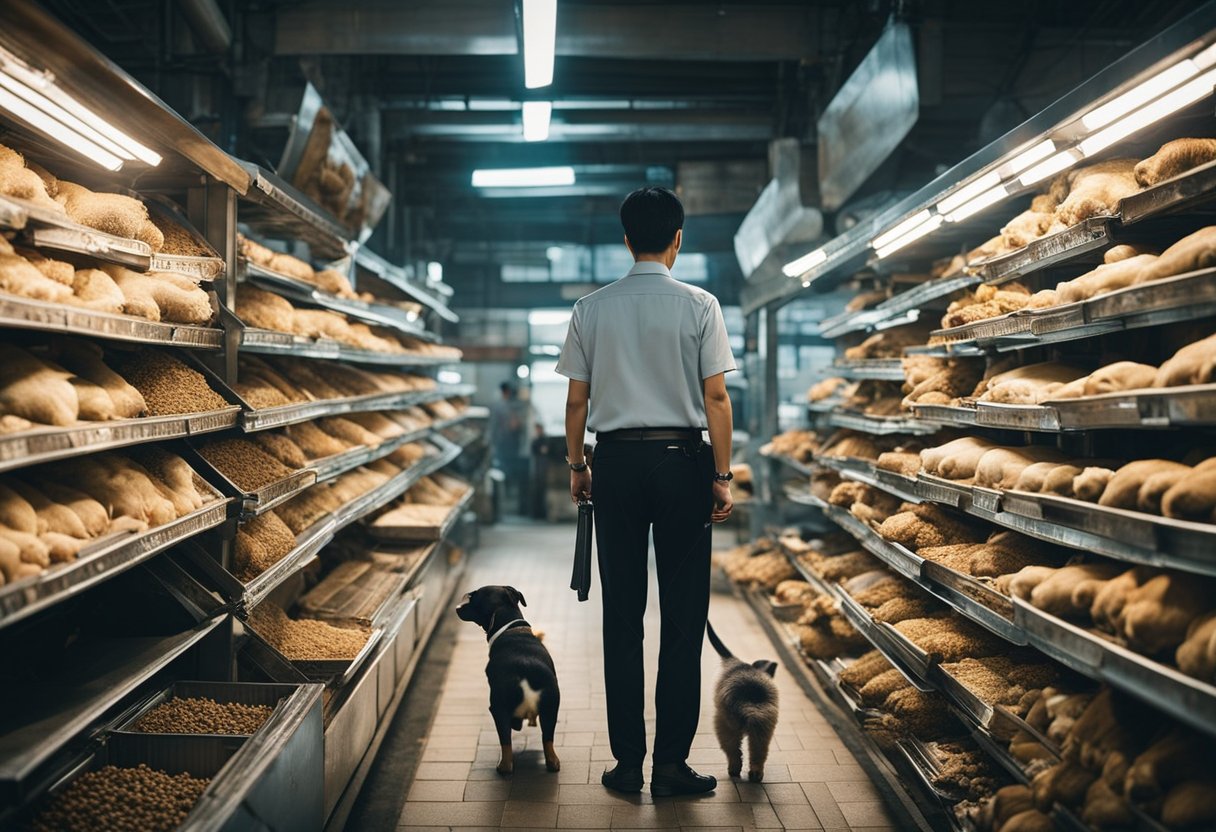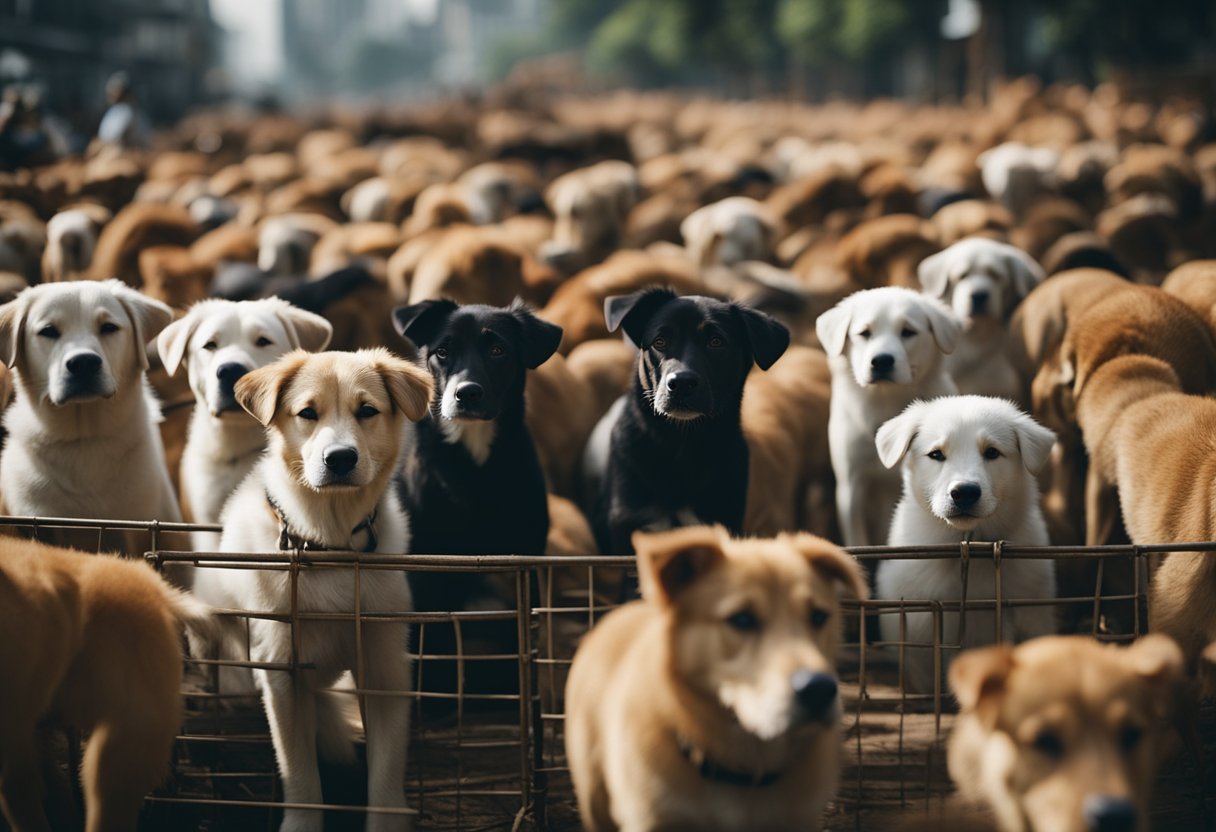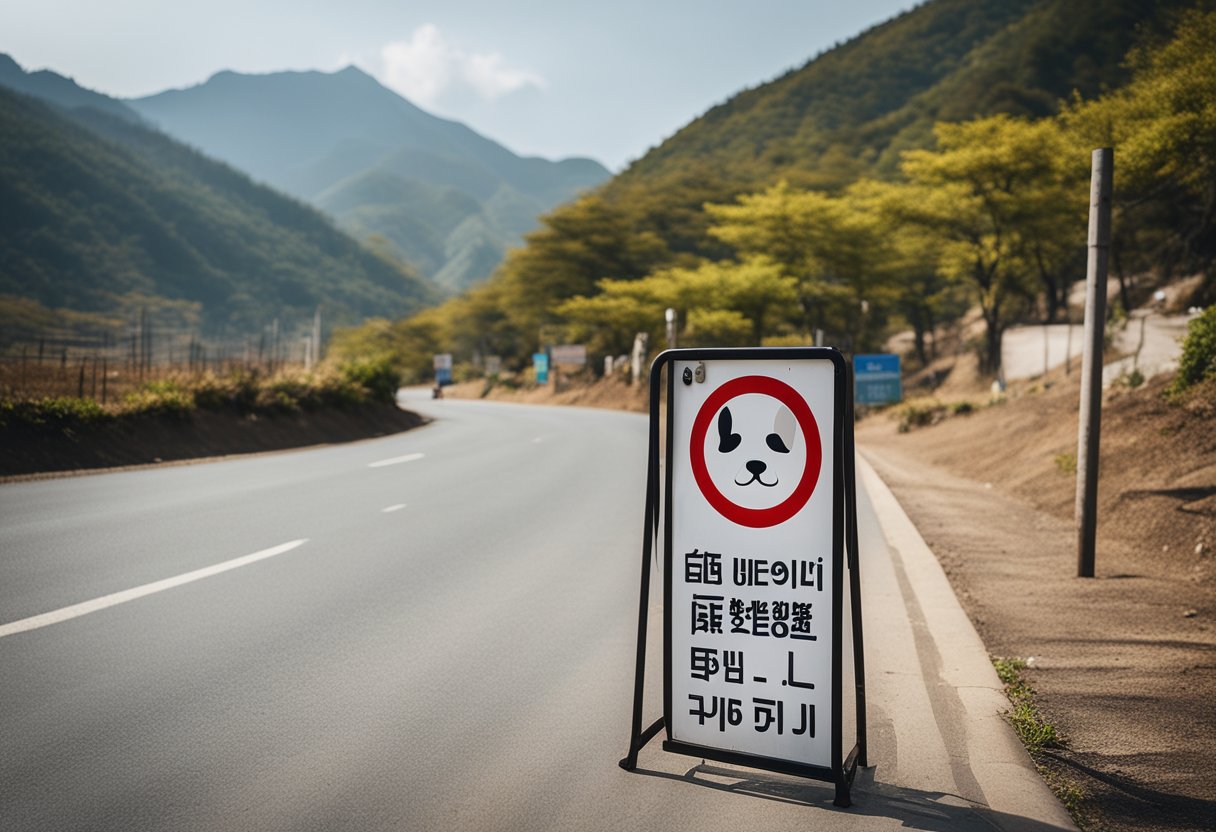Last Updated on January 12, 2024 by admin
South Korea has recently taken a significant legislative step by passing a bill that bans the production, sale, and consumption of dog meat, a practice that has been a part of the country’s culinary tradition for centuries. With changing societal attitudes and increased focus on animal rights, this move reflects a shift in public opinion. The legislation was met with widespread support from animal welfare groups, who consider it a major victory for the protection of animals.


The ban signifies a change in the cultural landscape, and it also impacts the lives of those involved in the industry. It is poised to transform the livelihoods associated with dog meat production, while also taking into account the enforcement and penalties for non-compliance. This event reinforces South Korea’s development in animal welfare and showcases the country’s response to international views on the consumption of dog meat.
Key Takeaways
- South Korea officially prohibits the dog meat trade, marking a historic policy change.
- The ban represents a pivotal moment for animal welfare and aligns with a broader societal shift.
- Legislation includes measures for enforcement, echoing a commitment to both cultural respect and animal rights.
Historical Context of Dog Meat Consumption


In South Korea, the consumption of dog meat has a history spanning centuries, traditionally woven into certain cultural practices.
Cultural Significance
Historically, in parts of South Korea, dog meat was consumed for its supposed health benefits and was particularly associated with Boknal, the country’s summer season. This tradition was believed to combat the heat and improve vitality. Dog meat dishes, such as bosintang (dog meat soup), were consumed during this period, reflecting its cultural significance within specific contexts.
Changing Perspectives
However, perspectives in South Korea have shifted significantly over time. The practice, once recorded in history books, has been met with differing opinions in contemporary society, leading to a decline in consumption. Increased awareness of animal rights, coupled with the changing attitudes of younger generations who view dogs primarily as pets rather than livestock, has contributed to this transformation. This societal change has ultimately led to legislative action to ban the dog meat industry in South Korea.
The Legal Journey to the Ban
The culmination of years of legislative restructuring and presidential influence has led to South Korea’s significant decision to legally prohibit the dog meat trade.
Legislative Developments
The National Assembly of South Korea took a decisive step by passing a bill that systematically phases out the dog meat trade by establishing a legal framework for its ban. This Special Act, a landmark law, was structured to cease the breeding and butchering of dogs for consumption. It marks a pivotal shift in legal attitudes toward what had been a longstanding albeit contentious practice.
Presidential Influence
President Yoon Suk Yeol played a critical role in the journey toward the ban. Even though the practice was declining in popularity, his administration’s stance signaled a clear call for legislative action. The president’s position echoed a mounting public sentiment for change, underscoring the importance of aligning legal actions with evolving public ethics and international perceptions of animal welfare.
Impact on Industry and Livelihoods


The legislative move to ban dog meat in South Korea marks a significant shift for several industries and countless livelihoods. Key players including dog farms, breeders, and businesses associated with the trade are facing a fundamental change.
Dog Farms and Breeders
Dog farms and breeders represent a substantial part of the dog meat industry in South Korea, which has been responsible for the breeding and slaughtering of up to an estimated one million dogs annually for consumption. The ban introduces a cessation of these operations, which potentially disrupts the traditional practices of these farms. These establishments must now navigate the transition away from dog meat production, posing challenges in adapting to new forms of livelihood.
Compensation for Businesses
The South Korean government is grappling with the economic fallout of such a ban on businesses reliant on the dog meat trade. Restaurants, many of which have specialized in dog meat dishes, along with farms and breeders, are being urged to shift their business models. Compensation programs or alternative livelihood options may be implemented to ease the transition for those affected, ensuring that farmers and restaurant owners are supported during and after the phasing out of dog meat sales.
Public Opinion and Societal Shifts


The pivotal change in South Korea’s stance on dog meat consumption is deeply rooted in evolving public sentiment and relentless efforts by activists. Shifting societal views are reflected in surveys, illustrating a waning appetite for dog meat and a growing conviction in animal welfare practices.
Surveys and Public Sentiment
Recent surveys indicate a clear shift in public opinion in South Korea. A Gallup Poll showed that a majority of South Koreans no longer view dog meat in a favorable light, with a significant portion of the population in favor of the recent legislation. The data revealed that younger generations, in particular, are more inclined to oppose the consumption of dog meat, suggesting a cultural shift that aligns with broader global standards of animal welfare.
Activism and Advocacy
Activists from organizations like Humane Society International have played a crucial role in altering perceptions towards the dog meat trade. Animal rights activists have been vocal, seeking to educate the public and government about the ethical implications of this practice. The work of these advocates culminated in a strong petition, which gathered substantial support, signaling an irrefutable call for change from both the Korean public and the international community.
Animal Welfare and Rights
The recent legislative change in South Korea reflects a significant shift in societal views on animal welfare and the rights of animals. This progression underscores the strengthening position animals hold in global ethical and legal discussions.
Ethical Considerations
The ethical shift towards more humane treatment of animals is evident in the recent decision by South Korea to ban the dog meat trade. This move stems from increasing social awareness and the efforts of animal rights groups who regard the consumption of dogs, traditionally seen as pets, as cruel. They advocate for the intrinsic rights of all animals to live without suffering.
Cats and other animals considered as pets have long been integrated into the circle of moral concern, whereby their welfare is of public interest. The Humane Society and other animal welfare organizations have played a pivotal role in amplifying the call for more humane treatment of animals, often leading to legislative reforms.
International Animal Rights
Internationally, animal rights extend to the principle of treating all animals with compassion and respect. The changes in South Korea align with a broader global consensus that is being shaped by animal lovers and animal welfare activists. The country’s ban sends a resonant message to nations where similar practices are still prevalent.
Countries are increasingly looking at legislation to reflect the evolving consensus on animal rights. With the support of international animal rights groups, there is a pressing argument against the commodification of animals, emphasizing that it is not only a domestic issue but one of global ethical importance.
Enforcement and Penalties


The recent legislation in South Korea banning dog meat trade introduces stern enforcement measures and hefty penalties for non-compliance, with the government and regulatory authorities empowered to administer fines and imprisonment terms.
Regulatory Authorities
The South Korean government has designated specific authorities responsible for the enforcement of the new legislation. These bodies are tasked with monitoring, detecting, and addressing any illegal activities related to the dog meat trade. They have the legal mandate to inspect businesses, ensure compliance, and investigate any suspected violations.
Business Compliance
Businesses previously involved in the dog meat trade must adhere to the new regulations or face significant penalties.
- Fine: A violation of the ban can result in a monetary fine of up to 30 million Korean Won (approximately $23,000 USD).
- Prison: More severe breaches, such as continuing to operate illegal dog meat farms, could lead to prison sentences ranging from two to three years.
Businesses are encouraged to seek out alternative livelihoods to transition away from any activities now deemed unlawful. Compliance is not optional, and the consequences of defiance are clear and enforceable.
Cultural and International Implications


The recent legislative ban on dog meat in South Korea marks a pivotal shift in both cultural norms and international relations. This complex issue navigates between the preservation of traditional values and responding to global standards on animal welfare.
Traditional Values Versus Modern Norms
The consumption of dog meat has a historical presence in South Korea, often associated with traditional culture. It reflects long-standing practices that persist in certain areas of the country. However, experts in social and cultural trends note a substantial shift as South Korean society grapples with modern principles, including increased attention to animal rights. This legislative change underscores the evolving societal norms where reality intersects with the legal landscape, setting a new precedent that aligns traditional culture with contemporary ethical standards.
Global Perception
Internationally, South Korea’s decision is seen as history in the making, enhancing its international image on the world stage. Adoption of such laws can potentially influence other nations, demonstrating a conscious effort to adopt policies that reflect a broader, global stance on animal welfare. Balancing international expectations with internal cultural dynamics has placed South Korea at the forefront of a major transformation in how nations respond to pressure for more humane treatment of animals. This move could lead to better relationships with countries advocating for animal rights, and establish South Korea as a leader in this domain.
The Road Ahead


With the landmark legislation to ban dog meat trade in South Korea, the nation stands at the precipice of significant cultural and industrial transformation. This move represents a tipping point that will necessitate a broad-based shift in both practice and mindset for people and industries involved.
Adaptation and Change
The Agriculture Ministry faces the challenge of devising programs that support the transition of businesses within the dog meat industry. Respondents from the farming sector will need to leverage the grace period provided by the law to realign their operations, either by repurposing their farms or by diverting resources to other types of livestock.
For those whose livelihoods were linked to the dog meat trade, accommodation in other agricultural sectors must be optimized. Policymakers are thus poised to create streamlined pathways for such distribution of resources and talents.
Future Legislation
Legislators and policymakers are set to tighten regulations during the phase-out period, enforcing compliance, and monitoring the decline of dog meat consumption. They must act with clarity and due diligence to ensure that laws keep pace with societal expectations and international standards on animal welfare.
Furthermore, the Ministry will likely concentrate on fostering public awareness campaigns about the legal changes and the ethical impetus behind them, helping to cushion the cultural shift for the general populace. This proactive approach could define South Korea’s future legislative landscape as it pertains to animal rights and related agrarian policies.
